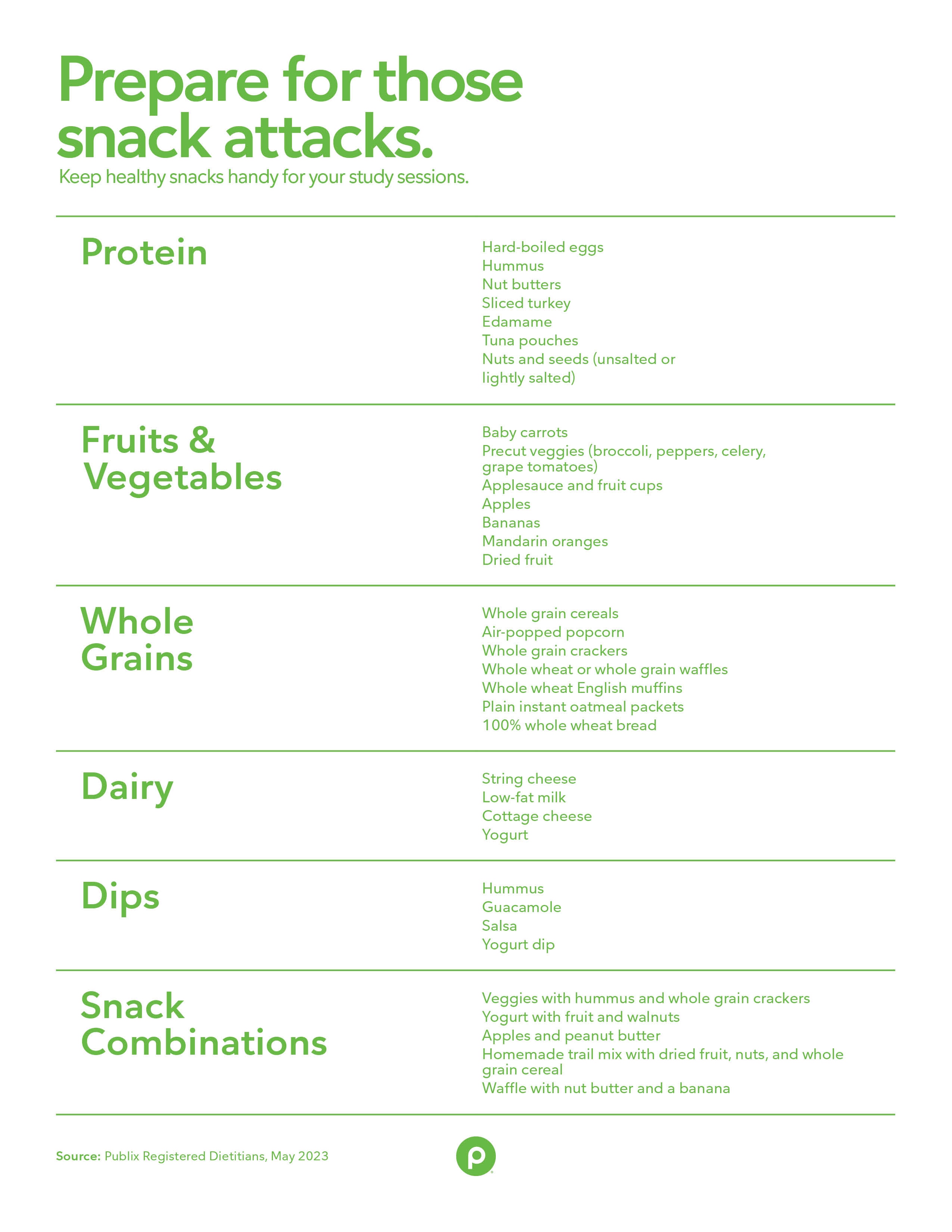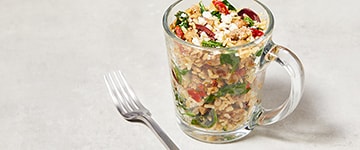Published August 1, 2023
As a college student, you face many challenges balancing classes, work, and exercise, as well as maintaining a social life. You need to find time to eat, and you have a lot of questions about nutrition. Our dietitians are here to help you navigate college life with our top six tips to improve your nutrition and overall wellness.
Recipes.
1. Have a healthy relationship with food.
While in college, many factors can make it difficult to maintain a healthy relationship with food. A busy workload, a limited budget, and an active social life can all impact the way we view food and our bodies. You may feel pressure to eat and look a certain way, and this may lead to disordered eating. Learn more about intuitive eating and how it can help you find freedom with food.

2. Eat balanced meals.
Prepping meals in college—especially a dorm—can be challenging but not impossible. Keep convenience items on hand in your dorm room, including frozen vegetables, microwavable rice and quinoa, canned tuna, hard-boiled eggs, and instant oatmeal packets. Try our recipes featuring microwave-ready rice!
- Maple–Ginger Cookie Breakfast Rice: Start off the day with brown basmati rice made with unsweetened vanilla oat or almond milk, maple syrup, banana, almond butter, chia seeds, ginger, cinnamon, and pecans. These ingredients are also great to have on hand to use in other recipes too.
- Greek-Style Turkey and Rice On-the-Go Mugs: This hearty meal will be a go-to. The recipe makes six servings, so you'll have leftovers or enough to invite friends for a quick study-session meal. Heat brown rice, frozen precooked ground turkey, feta cheese, spinach, and olives in the microwave for this Mediterranean-inspired meal.
3. Choose your snacks wisely.
Use this guide to inform your healthy snacking options.

4. Try out new snack combinations.
Get creative and try some delicious and satisfying snack stash combinations. Here are a few to get you started.
- Veggies with hummus and whole grain crackers
- Yogurt with fruit and walnuts
- Apples and peanut butter
- Homemade trail mix with dried fruit, nuts, and whole grain cereal
- Waffle with nut butter and a banana
5. Go easy on the caffeine.
It might be tempting to turn to energy drinks and coffee to help you stay awake during a late-night study session, but too much caffeine can affect your sleep and overall energy level. According to the experts, 400 milligrams of caffeine, which is 4–5 cups of coffee per day, is the upper limit that probably won’t cause side effects. But sensitivity to caffeine is individualized.1 There’s a wide range of caffeine content in beverages, and serving size matters. Keep in mind the FDA doesn’t require caffeine to be listed on the label.
Use this guide to help manage your caffeine intake.
6. Prioritize sleep.
Sleep is linked to nutrition. If you don’t get enough, you may have trouble regulating your hunger hormones. Get tips to sleep better.
Know where to look for information.
Advice on nutrition and fitness is all over YouTube, Instagram, Facebook, and TikTok. You know it’s not all true, but how can you sort fact from fiction? Our dietitians help you avoid nutrition misinformation.
For the love of you.
Choosing how you eat is uniquely personal. It’s about your needs, your preferences, and your goals. As your wellness ally, we’re in your corner with fresh ideas, recipes, and wellness icons that make it easier to shift toward wiser food choices. It’s all about you, at your very best.
Sources
1Spilling the Beans: How Much Caffeine Is Too Much? U.S. Food & Drug Administration. December 12, 2018.

 You are about to leave publix.com and enter the Instacart site that they operate and control. Publix’s delivery and curbside pickup item prices are higher than item prices in physical store locations. Prices are based on data collected in store and are subject to delays and errors. Fees, tips & taxes may apply. Subject to terms & availability. Publix Liquors orders cannot be combined with grocery delivery. Drink Responsibly. Be 21. For prescription delivery, log in to your pharmacy account by using the Publix Pharmacy app or visiting
You are about to leave publix.com and enter the Instacart site that they operate and control. Publix’s delivery and curbside pickup item prices are higher than item prices in physical store locations. Prices are based on data collected in store and are subject to delays and errors. Fees, tips & taxes may apply. Subject to terms & availability. Publix Liquors orders cannot be combined with grocery delivery. Drink Responsibly. Be 21. For prescription delivery, log in to your pharmacy account by using the Publix Pharmacy app or visiting 
